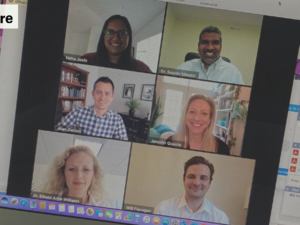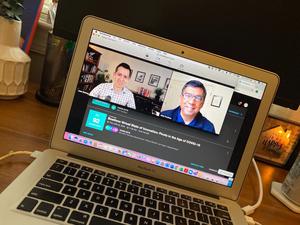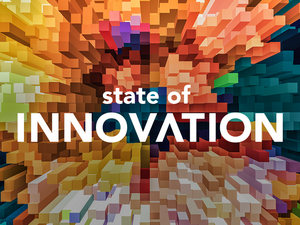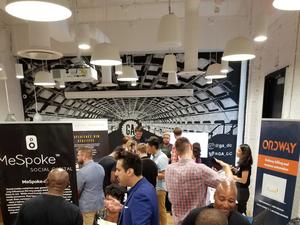
Editor's Note: This is a part of a series of in-depth industry deep dives we are doing leading up to our State of Innovation business conference on Thursday, June 26 from 8 a.m. to 1 p.m. at Arena Stage. Former D.C. Mayor Adrian Fenty will be headlining the event that will feature an exciting line-up of leading professionals in areas including education, healthcare, policy, venture capital and advertising. The business gurus will be featured on panels where they'll be asked about the future of innovation in D.C. Make sure to get your tickets now to State of Innovation.
Healthcare innovation in the D.C. region represents a complex ecosystem of biomedical research, digital startups, big data analytics and, inevitably in the nation's capital, politics and policy. Public and private efforts across the District and most of two states have the region a mecca for health-related companies and investors from barely formed startups to some of the biggest corporations in the world. And it's not slowing down now. Announcements come out every week of new medicines, new ways to help people stay healthy and for healthcare providers to improve their patients lives. There's plenty of highlights in healthcare innovation for D.C., Maryland and Virginia to be proud of, and challenges worth considering as the setting grows and evolves. Take a look at some of the facets of healthcare innovation in the region and what their future could hold.
The future of medicine and medical tech
Biotech and biomedical research is what most people think of first when health innovation is mentioned. In the D.C. region, there's plenty to think about. Maryland's biotech corridor in Montgomery County is famous for its efforts to encourage biotech companies to start or move there. Tax breaks and financial incentives at the state and local level, help with lab space and all kinds of other goodies are all part of the package. The Invest Maryland Challenge flat out awarded local biotech companies and was even used as a way to encourage companies from elsewhere to move and be eligible. Startups and bigger pharmaceutical companies in the area are working on research like a MERS vaccine at Novavax, a faster cancer diagnosis method at Personal Genome Diagnostics and combatting drug-resistant bacterial infections at Synthetic Biologics. Meanwhile, despite stumbles like the recent bankruptcy of Chantilly BioPharma, Virginia is a player in the field too. Government research at DARPA and success stories like spinal device maker K2M, which just had a $120 million IPO, keep interest in the region for biotech alive.
Biotech can mean big risk but also huge rewards for investors who pick the right company. Glycomimetics has been regularly raking in millions off a deal with Pfizer for sickle cell anemia treatments, while the Personal Genome Diagnostics cancer diagnosis scored it a $2.8 million deal and investors like Oxford Finance in Alexandria are happy to pump millions into promising biotech companies. There's not going to a lack of funding for biomedical research as long as people get sick or injured, if only because, cynical as it sounds, there's far too much money in it.
Digital health future
Turning digital information into healthy living is exactly the kind of thing that appeals to developers, investors, healthcare providers and really just anyone. On the consumer side of keeping people healthy, the first thing people want to know is if there's an app for it. The mobile health revolution has produced plenty of apps and wearable technology to monitor and advise people on health issues. It goes beyond what the average consumer might get too. Babysteps is an app designed to help pregnant women monitor and maintain their health but it can actually only be prescribed by a doctor. It's at the forefront of the prescription app movement, which help doctors keep tabs on patients and watch out for emergencies before they happen. As and when Apple rolls out its smartwatch, and more companies produce their own wearable tech that can monitor health, there's sure to be an explosion of apps and tools that use them for health purposes.
Data on a larger scale is another part of digital health driving innovation and investment. Companies like Valityx apply big data analytics to healthcare to improve hospital efficiency, while companies like CriticMania wants to bring the same kind of feedback responsiveness to healthcare that is already part of other businesses.
The Affordable Care Act and health innovation
The ACA changed a lot of the U.S. healthcare system, sometimes in very obvious, flashy ways, and sometimes subtly enough that there are still plenty of people who don't realize that things like being able to stay on parents insurance until age 26 and the end of insurance companies denying coverage are all part of the same law as the creation of insurance exchanges and the individual mandate. Even though the law passed four years ago, it's very hard to gauge its impact in the realm of health innovation. There are some trends and predictions that are at least partly traceable to the law. Incentives for insurance companies to encourage their customers and businesses insuring employees to stay healthy with lifestyle programs also inspire the creations of those programs by developers. Looking for ways to lower healthcare costs and slow the rise of expenses also encourages investment in healthcare analytics and data investigations that help people indirectly by improving service providers. And although not directly related to the ACA, the the push for government data transparency in recent years has provided a lot more big picture data to help startups build the kind of services and analytics programs they would never have been able to gather enough data to do on their own.
What's Next?
Health and healthcare are always high on the list of priorities for everyone whether consumer, startup, investor, corporation or government. The D.C. region has some unique advantages when it comes to innovating in healthcare that make it stand out though. The influence of the federal government is a boon for research into biotech and into the important tangential fields like data analytics. State and local governments too are eager to help foster innovation in healthcare in ways that have made them known around the world as hubs of innovation. And with new technology and new opportunities abounding all the time, the future of health and healthcare innovation around D.C. is looking fit enough to run a marathon.
Image via Shutterstock




